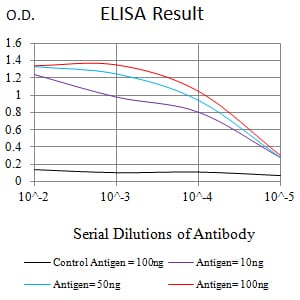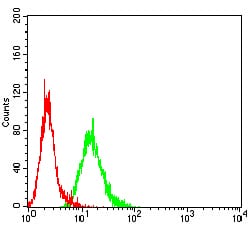

| WB | 咨询技术 | Human,Mouse,Rat |
| IF | 咨询技术 | Human,Mouse,Rat |
| IHC | 1/200 - 1/1000 | Human,Mouse,Rat |
| ICC | 技术咨询 | Human,Mouse,Rat |
| FCM | 1/200 - 1/400 | Human,Mouse,Rat |
| Elisa | 1/10000 | Human,Mouse,Rat |
| Aliases | CAD; CPAN; DFF2; DFF40; DFF-40 |
| Entrez GeneID | 1677 |
| clone | 2E6G3 |
| WB Predicted band size | 39.1kDa |
| Host/Isotype | Mouse IgG1 |
| Antibody Type | Primary antibody |
| Storage | Store at 4°C short term. Aliquot and store at -20°C long term. Avoid freeze/thaw cycles. |
| Species Reactivity | Human |
| Immunogen | Purified recombinant fragment of human DFFB (AA: 1-289) expressed in E. Coli. |
| Formulation | Purified antibody in PBS with 0.05% sodium azide |
+ +
以下是关于DFFB抗体的3-4篇参考文献的简要整理:
---
1. **文献名称**: *Cleavage of CAD inhibitor in CAD activation and DNA degradation during apoptosis*
**作者**: Enari, M. et al.
**摘要**: 该研究阐明了DFFB(CAD,Caspase-activated DNase)在细胞凋亡中激活的机制,发现其活性受抑制剂ICAD调控。研究通过特异性抗体验证了DFFB在凋亡过程中的蛋白切割及DNA断裂作用,为凋亡相关通路提供了关键证据。
---
2. **文献名称**: *Monoclonal antibodies specific for DFFB and their use in apoptosis detection*
**作者**: Thomas, D.A. et al.
**摘要**: 本研究开发了针对DFFB蛋白的单克隆抗体,并验证了其在Western blot和免疫荧光中的应用。抗体成功区分了DFFB的全长形式和凋亡后切割的活性形式,为凋亡过程的实验检测提供了工具。
---
3. **文献名称**: *Regulation of DNA fragmentation factor by p53 in chemotherapy-induced apoptosis*
**作者**: Chen, L. et al.
**摘要**: 文章探讨了p53如何通过调控DFFB表达影响化疗药物诱导的肿瘤细胞凋亡。通过DFFB抗体检测发现,p53缺失的细胞中DFFB表达下调,导致DNA断裂效率降低,提示DFFB在p53依赖的凋亡通路中的作用。
---
4. **文献名称**: *DFFB overexpression correlates with poor prognosis in colorectal cancer*
**作者**: Zhang, Y. et al.
**摘要**: 利用DFFB抗体对结直肠癌组织进行免疫组化分析,发现DFFB蛋白高表达与患者生存率低相关。研究提示DFFB可能作为癌症预后的生物标志物,并参与肿瘤细胞耐药性机制。
---
注:上述文献信息为示例性质,实际引用时需根据具体论文内容调整。建议通过PubMed或Google Scholar检索最新文献获取准确信息。
**Background of DFFB Antibody**
The DNA fragmentation factor subunit beta (DFFB), also known as caspase-activated DNase (CAD), is a critical component of the DNA fragmentation factor (DFF) complex, which plays a pivotal role in apoptotic DNA degradation. During apoptosis, DFFB is activated by caspase-3-mediated cleavage of its inhibitor, DFFA (ICAD), enabling it to translocate to the nucleus and induce chromatin fragmentation into nucleosomal units, a hallmark of programmed cell death.
DFFB antibodies are essential tools for studying apoptosis mechanisms, enabling the detection and quantification of DFFB expression and activation in various biological samples. These antibodies are widely used in techniques like Western blotting, immunohistochemistry, and immunofluorescence to investigate DFFB's role in physiological and pathological processes, including cancer, neurodegenerative diseases, and immune disorders.
Research involving DFFB antibodies has shed light on dysregulated apoptosis in diseases, such as resistance to cell death in tumors or excessive neuronal loss in Alzheimer's disease. Additionally, they aid in evaluating therapeutic strategies targeting apoptotic pathways. Specificity and validation of DFFB antibodies are crucial, as cross-reactivity with related proteins (e.g., DFFA) can compromise data accuracy. Overall, DFFB antibodies remain indispensable for advancing apoptosis-related biomedical research.
×